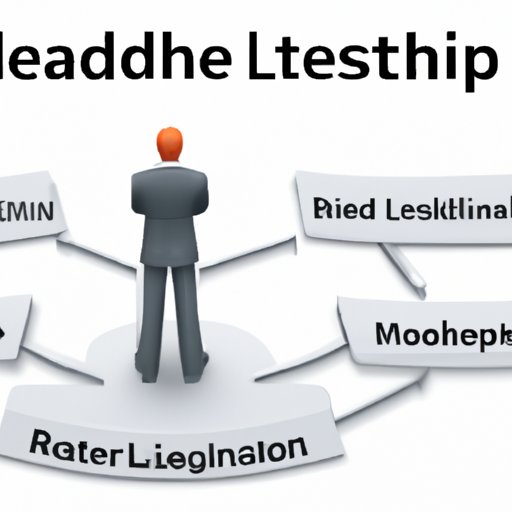Introduction
Leadership is the ability to motivate and inspire others to achieve a common goal. A great leader is one who can guide their team members to success while maintaining a positive and supportive environment. Becoming a great leader requires a combination of traits, skills, and behaviors that can be developed over time.

Identifying and Developing Leadership Qualities
There are certain qualities that all great leaders have in common. Developing these qualities will help you become an effective leader.
Self-Awareness
Self-awareness is the ability to recognize your strengths and weaknesses and understand how they affect your decisions and actions. It also involves understanding the impact of your words and behavior on others. Being self-aware will help you be aware of the needs of your team and act accordingly.
Empathy
Empathy is the ability to understand and share the feelings of another person. As a leader, it’s important to be able to put yourself in the shoes of your team members in order to respond to their needs. Empathy will also help you build stronger relationships with your team, which is essential for establishing trust.
Decision Making
Leaders must be able to make difficult decisions quickly and confidently. This requires having the courage to make unpopular decisions when necessary and the ability to weigh different options and choose the best course of action. Good decision-making skills are essential for any leader.
Adaptability
Great leaders must be able to adapt to changing circumstances and environments. This means being open to new ideas, trying different approaches, and adjusting strategies when needed. Adaptability is key to staying ahead in a rapidly changing world.
Integrity
Integrity is the quality of being honest and having strong moral principles. As a leader, it’s important to be trustworthy and reliable. Your team needs to know they can count on you to do the right thing, even when it’s not easy.

Understanding Your Role as a Leader
Once you’ve identified and developed your leadership qualities, it’s important to understand your role as a leader. This includes clarifying goals, prioritizing tasks, and delegating responsibilities.
Clarifying Goals
As a leader, it’s important to clearly define the goals of the team and make sure everyone is working towards the same objectives. This ensures that everyone is on the same page and working together to achieve success.
Prioritizing Tasks
Leaders must be able to prioritize tasks based on importance and urgency. This will ensure that important tasks are completed first and resources are used efficiently.
Delegating Responsibilities
Leaders must be able to delegate responsibilities to the appropriate team members. This requires understanding the strengths and weaknesses of each team member and assigning tasks accordingly. Delegating responsibilities will help ensure that tasks are completed on time and to the highest standard.
Building Trust Through Effective Communication
Trust is essential for any successful team. Building trust requires effective communication between leaders and team members. This includes listening, speaking, and being respectful.
Listening
Leaders must be active listeners. This involves taking the time to listen to team members without interruption or judgment. Listening will help you better understand the needs of your team and foster an open and trusting environment.
Speaking
Leaders must also be able to communicate clearly and effectively. This involves speaking in a way that is concise, direct, and respectful. Effective communication will help ensure that team members understand instructions and expectations.
Being Respectful
Leaders must show respect for their team members at all times. This means treating them as equals and valuing their opinions and contributions. Respectful communication will help build trust and foster cooperation.
Setting a Positive Example for Others to Follow
Leaders must set a positive example for their team members to follow. This includes demonstrating commitment to the task at hand, showing appreciation, and showing respect.
Demonstrating Commitment to the Task at Hand
Leaders must demonstrate commitment to the task at hand by putting in the effort required to get the job done. This will help motivate team members to do the same.
Showing Appreciation
Leaders must show appreciation for their team members’ hard work and dedication. This will help build morale and foster a sense of loyalty among team members.
Showing Respect
Leaders must also show respect for their team members by recognizing their accomplishments and rewarding them for their efforts. This will help create a positive working environment and encourage team members to continue doing their best.

Creating a Vision and Inspiring Others to Achieve It
Great leaders must be able to create a vision and inspire others to achieve it. This includes establishing clear goals, communicating the vision, and supporting others in achieving the vision.
Establishing Clear Goals
Leaders must establish clear and achievable goals for their team. This will help team members stay focused and motivated to reach their objectives.
Communicating the Vision
Leaders must be able to effectively communicate the vision to their team. This involves articulating the vision in a way that is inspiring and motivating.
Supporting Others in Achieving the Vision
Leaders must provide support and guidance to their team in order to help them achieve the vision. This includes providing feedback, offering advice, and encouraging team members to push themselves to reach their full potential.
Encouraging Collaboration and Teamwork
Great leaders must foster collaboration and teamwork among their team members. This includes establishing group norms, facilitating dialogue, and promoting cooperation.
Establishing Group Norms
Leaders must set expectations for behavior and performance within the team. This will help ensure that team members are held accountable for their actions and that the team is working together effectively.
Facilitating Dialogue
Leaders must be able to facilitate meaningful dialogue among team members. This involves creating an open and safe environment for discussion and encouraging team members to express their thoughts and ideas.
Promoting Cooperation
Leaders must promote cooperation among team members by encouraging collaboration and respecting each other’s opinions. This will help create an environment of mutual respect and trust.
Conclusion
Becoming a great leader requires a combination of traits, skills, and behaviors. Identifying and developing leadership qualities such as self-awareness, empathy, decision making, adaptability, and integrity is essential. Understanding your role as a leader, building trust through effective communication, setting a positive example, and creating a vision are also critical components. Finally, encouraging collaboration and teamwork will help ensure a successful team.
Leadership is an ongoing process of learning and growth. With dedication and practice, anyone can become a great leader.
(Note: Is this article not meeting your expectations? Do you have knowledge or insights to share? Unlock new opportunities and expand your reach by joining our authors team. Click Registration to join us and share your expertise with our readers.)
